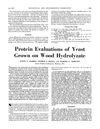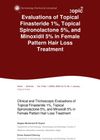 13 citations
,
July 1951 in “Industrial & Engineering Chemistry”
13 citations
,
July 1951 in “Industrial & Engineering Chemistry” Yeast grown on wood sugar with added methionine could be a cheap alternative to animal protein for feed.
 January 2025 in “Dermatology Practical & Conceptual”
January 2025 in “Dermatology Practical & Conceptual” Topical finasteride is as effective and safe as minoxidil for treating female pattern hair loss.

Current methods can't accurately predict which long-form answers people prefer; evaluations should consider different answer qualities separately.
October 2022 in “Hair Transplantation” Successful hair transplants need enough donor hair and careful planning.
 January 2022 in “Cellular and Molecular Biology”
January 2022 in “Cellular and Molecular Biology” Adding Triamcinolone to the anesthetic can reduce swelling after hair transplants, and using Platelet-Rich Plasma can improve hair thickness and patient satisfaction. The SRD5A2 gene also plays a key role in the success of hair transplants.



